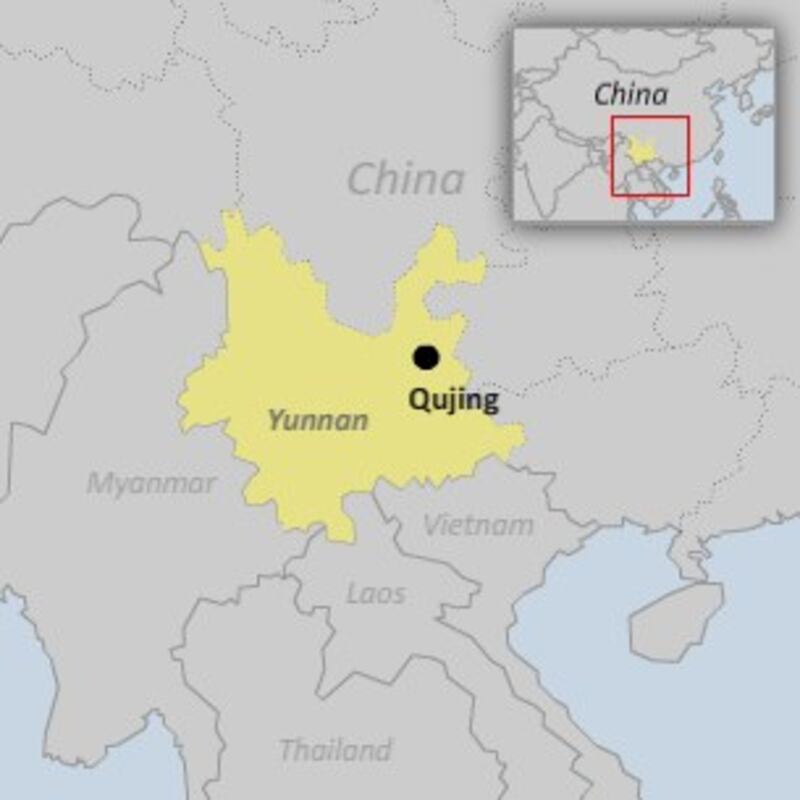China on Friday pledged a renewed clampdown on the dumping of toxic waste following a chromium pollution scandal in its southwestern province of Yunnan which has prompted food safety fears in Hong Kong.
Beijing's Ministry of Environmental Protection deputy director Zhang Lijun said any new industrial projects will be on hold for the time being in Yunnan's Qujing city, where a local chemical company was found to have dumped more than 5,000 tons of toxic chromium into the local water supply.
The Qujing dumping scandal, along with many other cases across the country, shows "widespread inadequacies in handling and disposal of hazardous waste in the country and pose[s] a threat to public health," Zhang said in a statement on the ministry's website.
According to officials in the Qujing municipal government, two truck drivers illegally dumped 5,222 tons of chromium compound waste, a highly toxic heavy metal, in three townships near the city between April and June.
Qujing in eastern Yunnan is a key industrial city, and is the second largest city by population in the province. The dumping contaminated the Nanpan river and prompted a large-scale clean-up operation.
Plant still polluting
But residents who live near the chromium producer Yunnan Province Luliang Chemical Industry plant said it is still pumping out wastewater into the local river.
"We have been to see them several times," said a resident of nearby Youxiatong village surnamed Qian. "Not just the chemical factory but also the environmental protection bureau."
"They all say that there is no more pollution, but there is still a location at which it's seeping into the Nanpan river, because the groundwater in that area is all yellow," he said.
"It's right across from the factory."
A number of residents of Qujing city said earlier this month that they were still afraid to drink the water in spite of official assurances, for fear the cleanup effort had been unsuccessful.
Wuhan-based environmental lawyer Wu Xiangbin, who has been helping the villagers press for further investigations, said it is highly likely that local officials are still hoping to cover up the full extent of the disaster.
"Of course the government's not going to admit it," he said. "Up until now they have only admitted to a small part of it."
"Tomorrow we are going to hold a meeting with the news media in Beijing."

Hong Kong food threat?
The dumping of the toxic waste in Qujing has sparked fears that Hong Kong's food supplies, especially mainland-sourced vegetables, would be contaminated.
Public health officials in Hong Kong have tested more than 900 samples of vegetables grown in the neighboring Pearl River Delta in an attempt to stave off panic over food supplies sourced in mainland China.
"Initial results show that there were two or three farms which were in the region in question," Hong Kong's secretary for food and health York Chow told reporters this week.
"But we have been unable to determine immediately whether or not they were affected by the water pollution," Chow said. "We will have to investigate further, and at the same time we will be testing vegetables supplied to Hong Kong."
So far, tests in Hong Kong have identified chromium in six samples, one of which exceeded safety levels set by mainland China, though not those of Hong Kong.
Vivien Yao, water pollution expert at Greenpeace in Hong Kong, said that toxic waste, once dumped, isn't always limited to a particular area.
"The pollution levels [in vegetables] have already surpassed acceptable levels," Yau said in an interview on Wednesday.
"We have called on the government to carry out a comprehensive investigation ... and to expand testing beyond the two Yunnan farms already tested."
'Everything has tested normal'
The pollution also sparked fears that the chromium would be carried downstream into the Dongjiang and Pearl Rivers, but Guangdong water resources officials said that no traces had yet been found.
"So far everything has tested normal," said a water resources official at the Pearl River Water Resources Bureau in neighboring Guangdong province. "We have tested for elevated levels of chromium."
"We tested in all the same places that Greenpeace tested," he said. "We came up with the same results they did."
Hong Kong officials said the Dongjiang river, which supplies the territory with water, had tested within safety limits between Aug. 2 and 16.
China has been rocked by a series of heavy-metals poisoning scandals after years of lax enforcement of what environmentalists say are, on paper, high environmental standards.
Many of the poisonings have involved lead and various toxins from chemical and electronics factories, often affecting the health of local children.
Reported by Wen Yuqing for RFA's Cantonese service and by Ding Xiao for the Mandarin service. Translated and written in English by Luisetta Mudie.
